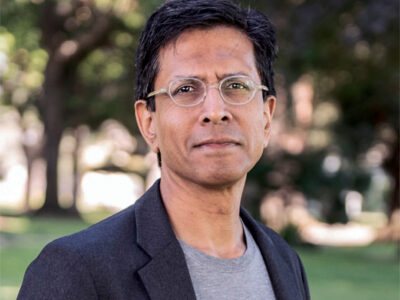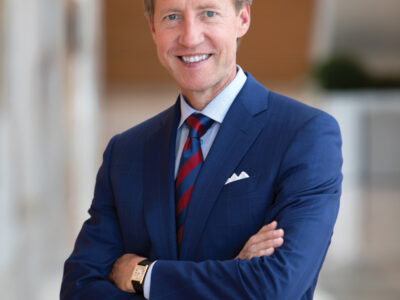These times will bring out the best in the Penn family.
By Amy Gutmann
Long before the beginning of the stock market’s decline, Penn was prepared for the likelihood of difficult economic times ahead. Thanks primarily to expert fiscal management, prudent investment strategies, a robust health system, and record-breaking fundraising during the first year of our five-year Making History campaign, we began the current academic year with the financial strength to move forward on our highest priorities. These priorities include making Penn more affordable to talented undergraduate, graduate, and professional students of all backgrounds, and funding professorships, academic initiatives, and state-of-the-art facilities that support Penn’s eminence in teaching, research, and clinical practice.
We will continue to support these high-priority initiatives. We will continue honoring our long-standing commitment to practicing need-blind admissions and meeting full financial need, and we will proceed with our plans to substitute grants for student loans for all undergraduate aid packages beginning September 2009. We will stand behind our most recent increases in graduate student stipends, the most generous in Penn’s history. We will move forward on our Penn Integrates Knowledge Neuroscience Initiative, made possible by a path-breaking $50 million contribution from Penn’s health system, which will support five new PIK professors and catapult Penn forward in the study of the brain and its relationship to behavior and neurological diseases. And we will proceed with our highest priority capital projects, including a spectacular new College House and quad on Hill Square, the Krishna P. Singh Nanotechnology Center, and the completion of the Roberts Proton Therapy Center and Anne and Jerome Fisher Translational Research Center, both of which will be located next to the Ruth and Raymond Perelman Center for Advanced Medicine.
We are also prepared to weather a longer and steeper economic downturn that could cause our funding levels to drop. (Already, the Commonwealth has cut its annual appropriation for Penn Veterinary Medicine.) We recently announced a series of additional steps to further curtail our expenses. Over the next 18 months, each school and center will take steps to control personnel expenses, which account for more than one-half of the University’s annual operating budget. For example, to conserve resources and to preserve jobs, we will curb raises across the board, with senior leadership, myself included, foregoing any salary increase next year. All open staff positions will be carefully reviewed prior to filling, and faculty searches will be reexamined by the deans. We will sharply curtail non-compensation expenses such as travel, meals, and conferences. And we will proceed on only those building projects that have secured sufficient funds through naming gifts or major grants. In order to shepherd resources for our highest priorities, we will hold the line on administrative spending by freezing baseline budgets for core administrative service centers at FY2009 levels.
While we are not implementing broad-scale layoffs, hiring freezes, or across-the-board budget reductions, individual schools and centers have the flexibility to create balanced and sustainable budgets.
Building on Penn’s entrepreneurial talent for stretching each dollar as far as possible, these measures will help us prudently negotiate whatever rough economic terrain we encounter in the weeks and months ahead. In order to maximize our potential and to secure our long-term future as an eminent teaching and research University, we also need every segment of Penn’s extended family to come through for each other.
Our founder Benjamin Franklin famously said that an investment in knowledge pays the best interest. Every day, our faculty members and students prove that Franklin was prescient—especially about Penn. They are discovering cures for disease, creating and performing daring works of art, curating groundbreaking exhibits, restoring civic health to our democracy, and changing the world—often one life at a time, whether it is in a neighborhood school in Philadelphia, a health clinic in Botswana, or a village in Southeast Asia.
I feel blessed with an extended Penn family of fabulous alumni, parents, and friends all. Your engagement and support remain essential to achieving our Penn Compact’s goals of increasing access to a Penn education for the most talented students; of integrating knowledge throughout our eminent teaching, research, and clinical programs; and of increasing Penn’s local and global engagements. By being so keenly mission-focused, Penn can educate great future leaders and produce the kind of knowledge that will help to create a better and more sustainable future for our children and grandchildren.
And here’s an added bonus: Penn will always be there for you—not only as an inexhaustible source of intellectual and professional enrichment, but also as a fully engaged and energized network of friendship and support. We recently launched an improved version of PACNET, our alumni career network of alumni mentors who provide career advice to students and other alumni. And in anticipation of a worsening economic climate, we created a new position—director of alumni education and career networking—primarily to develop on line resources to connect Penn Alumni to professional mentoring relationships, jobs in various fields, and opportunities for professional advancement.
Most of us have never experienced times such as these. Yet I remain more confident than ever about Penn’s future. During days much darker than our own, Abigail Adams wrote these words to her son John Quincy:
“These are the times in which a genius would wish to live. It is not in the still calm of life, or the repose of a pacific station, that great characters are formed. The habits of a vigorous mind are formed in contending with difficulties. Great necessities call out great virtues. When a mind is raised, and animated by scenes that engage the heart, then those qualities which would otherwise lay dormant, wake into life and form the character of the hero and the statesman.”
In its long 268-year history, Penn has endured more than its share of trials, hardships, and calamities—including a war of independence, a civil war, two world wars, many boom-to-bust cycles and recessions, and the Great Depression. Yet, the tougher the challenge, the stronger Penn grew—and the better the world became as a result. We built America’s first teaching hospital, invented the liberal arts curriculum and modern business education, launched the digital age, designed great cities, and saved lives. I am confident that these times will bring out the best in our students, faculty, alumni, parents, and staff—who collectively possess in abundance the great virtues described by Abigail Adams. As strong as we are today, the great necessities of our time are eliciting our greatest virtues. Together we shall prove that the best of Penn—our teaching, research, and service—is yet to come.




